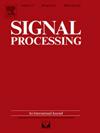Proximal gradient algorithm with dual momentum for robust compressive sensing MRI
IF 3.4
2区 工程技术
Q2 ENGINEERING, ELECTRICAL & ELECTRONIC
引用次数: 0
Abstract
Adopting the new signal acquisition technology Compressive Sensing (CS) to Magnetic Resonance Imaging (MRI) reconstruction has been proved to be an effective scheme for reconstruction of high-resolution images with only a small fraction of data, thus making it the key to design a reconstruction algorithm with excellent performance. To achieve accelerated and robust CS-MRI reconstruction, a novel combination of Proximal Gradient (PG) and two types of momentum is developed. Firstly, to accelerate convergence of the PG iteration, we introduce the classical momentum method to solve the data-fitting subproblem for fast gradient search. Secondly, inspired by accelerated gradient strategies for convex optimizations, we further modify the obtained PG algorithm with the Nesterov's momentum technique to solve the prior subproblem, boosting its performance. We demonstrate the effectiveness and flexibility of the proposed method by combining it with two categories of prior models including a weighted nuclear norm regularization and a deep CNN (Convolutional Neural Network) prior model. As such, we obtain a dual momentum-based PG method, which can be equipped with any denoising engine. It is shown that the momentum-based PG method is closely related to the well-known Approximate Message Passing (AMP) algorithm. Experiments validate the effectiveness of leveraging dual momentum to accelerate the algorithm and demonstrate the superior performance of the proposed method both quantitatively and visually as compared with the existing methods.
鲁棒压缩感知MRI的双动量近端梯度算法
将新的信号采集技术压缩感知(CS)应用于磁共振成像(MRI)重建已被证明是一种仅使用少量数据就能重建高分辨率图像的有效方案,因此设计一种性能优异的重建算法是关键。为了实现加速和稳健的CS-MRI重建,开发了一种新的近端梯度(PG)和两种动量的组合。首先,为了加快PG迭代的收敛速度,引入经典动量法求解快速梯度搜索的数据拟合子问题。其次,受凸优化的加速梯度策略的启发,我们进一步利用Nesterov动量技术对得到的PG算法进行改进,以解决先验子问题,提高其性能。我们通过将该方法与两类先验模型(包括加权核范数正则化和深度CNN(卷积神经网络)先验模型)相结合,证明了该方法的有效性和灵活性。因此,我们得到了一种基于双动量的PG方法,该方法可以配备任何去噪引擎。结果表明,基于动量的PG方法与著名的近似消息传递(AMP)算法密切相关。实验验证了利用双动量加速算法的有效性,并证明了与现有方法相比,该方法在定量和视觉上都具有优越的性能。
本文章由计算机程序翻译,如有差异,请以英文原文为准。
求助全文
约1分钟内获得全文
求助全文
来源期刊

Signal Processing
工程技术-工程:电子与电气
CiteScore
9.20
自引率
9.10%
发文量
309
审稿时长
41 days
期刊介绍:
Signal Processing incorporates all aspects of the theory and practice of signal processing. It features original research work, tutorial and review articles, and accounts of practical developments. It is intended for a rapid dissemination of knowledge and experience to engineers and scientists working in the research, development or practical application of signal processing.
Subject areas covered by the journal include: Signal Theory; Stochastic Processes; Detection and Estimation; Spectral Analysis; Filtering; Signal Processing Systems; Software Developments; Image Processing; Pattern Recognition; Optical Signal Processing; Digital Signal Processing; Multi-dimensional Signal Processing; Communication Signal Processing; Biomedical Signal Processing; Geophysical and Astrophysical Signal Processing; Earth Resources Signal Processing; Acoustic and Vibration Signal Processing; Data Processing; Remote Sensing; Signal Processing Technology; Radar Signal Processing; Sonar Signal Processing; Industrial Applications; New Applications.
 求助内容:
求助内容: 应助结果提醒方式:
应助结果提醒方式:


